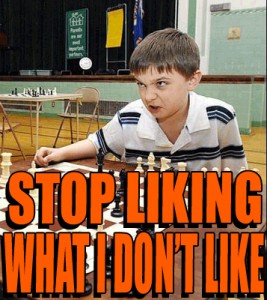Stop Liking What I Don’t Like!

This image perfectly identifies one of the biggest problems in the video game community right now. Gamers need to realize that games can be enjoyed by many different types of people for many different reasons.
I find it all too common that gamers latch onto a game, game developer, genre or console and defend it to the ends of the earth, while spending a lot of mental energy bashing all of its competitors. Whether it’s the argument between 2D and 3D fighting games, the siege between Call of Duty and every other FPS, the battle of the MMORPGs or the console wars of the 1990’s, gamers have been at each other’s throats about what part of their video game hobby is the best.
I would suggest a lot of this behavior has to do with the idea that gaming is an investment. We share in a relatively expensive hobby, whether you buy a ~$400 console, a $60 game or an MMO subscription for $14.99 a month. Gaming expenses add up and a lot of the gaming community can’t support buying every console or playing every game that comes out. Therefore, gamers attach themselves to the games, game developers, consoles and genres that they like, in an attempt to validate their investment. When another person suggests that one may have made the wrong investment, one may interpret it as a personal attack and get angry.
Other than that hypothesis, I don’t know anything else about why this behavior has become the norm, but I do know some ways to make sure you don’t become ‘that guy’.
Step 1: Calm down and take a deep breath
Getting angry about video games does absolutely nothing to further the conversation or improve the gaming community. In fact, all it does is make you look silly and pathetic. Instead, recognize that everyone has opinions and they are bound to differ from time to time.
Step 2: Remember, video games are a hobby
If talking or thinking about video games gets you riled up and upset, maybe this isn’t the right hobby for you. If you’re having fun playing games, on the other hand, all is well.
Step 3: Variety doesn’t do the video game community any harm
Just because you don’t like a certain game, developer, console or genre, that doesn’t mean others can’t enjoy it. Variety in video games helps the community expand and breeds competition and therefore innovation. You may like Call of Duty, but if we were only allowed to play FPS made by Activision, creativity in the FPS genre would come to a snail’s crawl.
Step 4: Remember, just because something is popular, that doesn’t mean it is bad
It’s a common habit for gamers to lash out at popular games, like World of Warcraft, Call of Duty and League of Legends for being popular and bringing new players into the video game community. This is almost a moot point, though, as popularity basically guarantees that someone enjoys the game and therefore it has fulfilled its purpose.
Step 5: That being said, popularity does not equal quality either
Just because all of your friends, their friends, your mother and your mother’s friends play a game, that doesn’t mean it is inherently better than other games. It does mean that it is fulfilling its job, but that doesn’t mean that its doing its job more than another game that is less popular. On the contrary, some of the best games in video game history weren’t very popular in their heyday.
At the end of the day, there will still be rivalries between gamers and their games, but I hope intelligent gamers can do their best to maintain composure and keep the ‘nerd rage’ in the video game community to a minimum.
Tags: Call of Duty, fps, hobby, League of Legends, MMO, MMORPG, RPG, VGC, video game, video game community, World of Warcraft



Awesome! The point about defending our investments seems to be a big part of it as this extends well into other industries as well. Anything with a big financial or emotional investment is going to provoke these sorts of rivalries as we don’t really like to find out we made the wrong decision about something. The car industry seems to be another one where these sorts of rivalries really crop up (Holden vs. Ford, Australians?).
Step 4 and 5 seem to line up with something that I think is important for intelligent gamers to take note of. It’s that we need to be able to recognize the value in things we don’t necessarily like ourselves. I’m not personally a big fan of the “Let’s Play” format of video on YT but I can definitely see the value they offer to the industry in growing indie titles way beyond their normal scope.
We are all gamers here, and that should unite us above any other petty rivalries.
Well said.
This is indeed systemic in the human experience. So many people get upset because of a particular fandom liking something “ridiculous,” whereas if the same fandom liked something else that they found interesting too (even if they weren’t a fan exactly themselves), they might be just fine with it.
Probably an example that gets overused nowadays, but look at the Brony phenomenon. People that don’t like the show rip into the fanbase almost to validate themselves in the eyes of the internet. I’m not a sports fan, and I don’t understand sports fans’ rabid reactions to sports stuff, but I’m not about to rip on them over that. To each his own. It’s almost like people consider fandoms they can’t bring themselves to take part in a threat, like we’re all in some bizarre internet turf war.
Good image, too. I am stealing it.
Thanks for the comment. I appreciate the feedback.